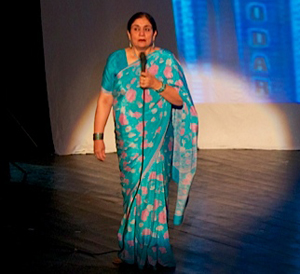Written by: Aleeza Rasool - Posted on: May 30, 2014 |  Comments | 中国 (Chinese)
Comments | 中国 (Chinese)
Google Translation: اُردو | 中文
As a part of its 30th anniversary celebrations, Ajoka Theatre held ‘Aaj Rang Hai’, a seven days Theatre Festival at the Alhamra Arts Council in Lahore last week. During this week-long extravaganza, Ajoka staged some of its most powerful and influential plays in front of the enthusiastic and appreciative audiences in Lahore. As is Ajoka’s signature style, the plays staged in Lahore were more than just entertaining; most carried profound, symbolic meanings within them and aimed for social change within Pakistan.
Along these lines ran ‘Hotel Mohenjodaro’, a theatrical rendition of Ghulam Abbas’s short story titled Dhanak, which never made it to Pakistan’s publishing houses because of its controversial content. Within the story, Abbas sketched a dismal state of the Republic of Pakistan in the future. He wrote about the country being plagued by religious extremism and sectarian violence and slowly burning to shreds. When read by Abbas at the meeting of the Halqa-e-Arbab-e-Zauq in Lahore in the year 1967, Dhanak caused quite a furor. Rightwingers and critics alike were outraged at the picture of religious zealots in the tale. It was not until the dawn of the era of religious extremism and sectarian violence within Pakistan that Dhanak’s significance was realized.
 |
‘Hotel Mohenjodaro’ begins with a scene from a party. There is singing and dancing and the audience are immediately engrossed into the play owing to its vibrant lights, colours and movements. The party is being held for a Pakistani astronaut by the name of Captain Adam Khan who has acquired the honour of being the first man to land on the moon. But, all of Pakistan is not happy about Adam’s great achievement. A local imam at a mosque within the city, terms Adam’s journey to the moon un-Islamic. Religious zealots call for Adam Khan’s death and fuel to the fire gets added when the wife of a foreign diplomat is seen kissing Adam Khan’s cheek. The government loses its battle with the clerics and eventually an Amir is appointed to rule the state of Pakistan. In the aftermath of this new establishment, a puritanical and highly conservative form of Islam comes into play within the country. But, “The initially overlooked question of which sect’s Shariah (religious rulings) would be implemented violently rises up. Blood runs in mosques. Muslims kill Muslims, with both sides fighting in the name of faith. Medievalism descends into chaos, (Saroop Ijaz).” The story ends with foreign aircrafts bombing the city into rubble until nothing is left.
Ghulam Abbas’s prophecy appears to have been realized today. Today’s Pakistan has become or is on the roads towards becoming the Pakistan of Dhanak. In the words of Madiha Gohar, “The accuracy with which Ghulam Abbas predicted Pakistan’s future is astonishing. It does not seem like this story was written five decades ago. But, rather it seems as if it is describing the country’s present times.”
 |
Madeeha Gauhar addresses the audience |
The grave and serious theme of the play was lightened up every now and then with the help of situational songs and dances by Ajoka’s crew. The number ‘Ban kero bhai ban kero!’ (Ban everything o brother!) was particularly enjoyed by all in the audience. The actors, background scores, songs, dances and the use of colourful lights and visual aids gave beautiful life to Ghulam Abbas’s words. “We must stop and think about what Ghulam Abbas must have seen in the Pakistan of the 60s that he wrote this story,” said Madiha Gohar. “Off course,” she added, “He must have seen the seeds of all of this being sown during his very own time!” Dhanak or the ‘Hotel Mohenjodaro’ was then, more of a prophecy rather than a story by Abbas.